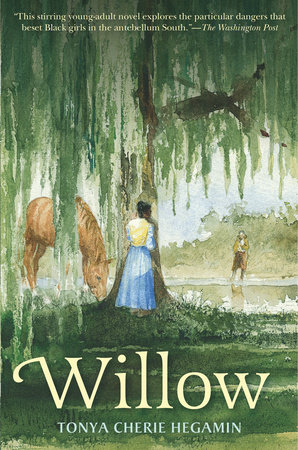In 1848, an educated slave girl faces an inconceivable choice — between bondage and freedom, family and love.On one side of the Mason-Dixon Line lives fifteen-year-old Willow, her master’s favorite servant. She’s been taught to read and has learned to write. She believes her master is good to her and fears the rebel slave runaways. On the other side of the line is seventeen-year-old Cato, a black man, free born. It’s his personal mission to sneak as many fugitive slaves to freedom as he can. Willow’s and Cato’s lives are about to intersect, with life-changing consequences for both of them. Tonya Cherie Hegamin’s moving coming-of-age story is a poignant meditation on the many ways a person can be enslaved, and the force of will needed to be truly emancipated.
Tonya Cherie Hegamin is the author of the young adult novel
M+O 4EVR and the coauthor with Marilyn Nelson of
Pemba’s Song. She received an Ezra Jack Keats New Writer Award and a Christopher Award for her picture book
Most Loved in All the World, illustrated by Cozbi Cabrera. Tonya Cherie Hegamin is the creative writing coordinator at Medgar Evers College in Brooklyn.
Stirring. . . . Readers will be caught up in the girl's quiet bravery and her search for the truth behind her mother's mysterious, long-ago death. Even as Tonya Cherie Hegamin reveals slavery's dehumanizing effect on every character — black and white, owned and owner — she also celebrates the power of friendship and love.
—The Washington Post
[A]ffecting . . . Hegamin has crafted a suspenseful coming-of-age novel filled with captivating and poetic language. Character building is strong, and Willow’s growth and transformation is both heartbreaking and inspirational. A must-read for those who enjoy historical fiction.
—School Library Journal
A riveting historical novel... The clear prose of Hegamin allows for a realistic, relatable narrative and underscores the injustices of enslavement. . . . Hegamin handles the adult realities of enslavement and the nineteenth-century setting appropriately for high school readers. ... Hegamin’s exemplary novel complements such classics as the slave narratives by Harriet Jacobs and Frederick Douglass.
—The Horn Book
This richly textured narrative deftly teases out attitudes that are too often simplified elsewhere. . . . An intelligent story. Hegamin touches on themes rarely treated with such grace and nuance; her combination of history, thoughtful reflection, suspense, and romance will satisfy broad readerly tastes.
—Bulletin of the Center for Children's Books
[An] arresting story, richly historical, with an engaging narrator and well-drawn secondary characters . . . A gripping . . . exploration of the anguishing impact of slavery.
—Kirkus Reviews
With an unflinching eye, Hegamin explores the complicated relationships created by slavery, and the horrors specific to being a female slave. ... [T]he final exploration of [Willow's family] secrets creates a beautiful parallel to Willow’s current dilemma. Duty, love, and the freedom to be a fully realized human being make up the crux of this stirring tale.
—Booklist
Tonya Cherie Hegamin slides period details into Willow's simple, insightful narrative, creating a fluid reading experience . . . "Willow" is a well-researched historical novel that features a unique aspect of American slavery.
—BookPage
A solid historical foundation, strong characterizations, and lyrical descriptions highlight Hegamin’s rich novel about slavery and black/white relations before the Civil War. . . . Engrossing and educational.
—Publishers Weekly
















